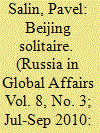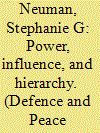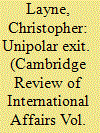| Srl | Item |
| 1 |
ID:
080841


|
|
|
|
|
| Publication |
2008.
|
| Summary/Abstract |
The United States' unipolar moment is over. International relations in the twenty-first century will be defined by nonpolarity. Power will be diffuse rather than concentrated, and the influence of nation-states will decline as that of nonstate actors increases. But this is not all bad news for the United States; Washington can still manage the transition and make the world a safer place
|
|
|
|
|
|
|
|
|
|
|
|
|
|
|
|
| 2 |
ID:
100617


|
|
|
| 3 |
ID:
082929


|
|
|
|
|
| Publication |
2008.
|
| Summary/Abstract |
Is the United States inevitably in decline? After the foreign policy controversies of the George W. Bush years, a new consensus declares the end of American dominion. In this article this conventional wisdom is challenged. The US constitutes an 'exceptional empire' and, despite the recent rise of powers such as the EU, China and India, the four foundations of this distinctive empire remain robust. First, the US still exhibits global predominance in hard power. Second, the essentially unipolar international order shaped by Washington remains resilient. Third, neither the rise of 'anti-Americanism' nor the alleged decline of US 'soft power' endanger its predominance. Fourth, the US political class is committed to preserving American primacy after Bush. No other power is currently in range of competing with the US for global influence. Moreover, each faces powerful internal weaknesses and external threats at least as significant as those facing the US. America's global predominance in hard and soft power do not translate into omnipotence. Nor does predominance promise an error-free foreign policy. The US nonetheless continues to defy both history and theory
|
|
|
|
|
|
|
|
|
|
|
|
|
|
|
|
| 4 |
ID:
093279


|
|
|
|
|
| Publication |
New Delhi, Academic Foundation, 2010.
|
| Description |
352p.
|
| Standard Number |
9788171887996
|
|
|
|
|
|
|
|
|
|
|
|
Copies: C:2/I:0,R:0,Q:0
Circulation
| Accession# | Call# | Current Location | Status | Policy | Location |
| 054691 | 330.9/VIR 054691 | Main | On Shelf | General | |
| 054793 | 330.9/VIR 054793 | Main | On Shelf | General | |
|
|
|
|
| 5 |
ID:
095042


|
|
|
|
|
| Publication |
2010.
|
| Summary/Abstract |
The global defense-industrial sector reflects the hierarchy of power in the post-Cold War world. As in the larger international system, the United States plays the dominant role in the defense sector as well. It is a comparative advantage often used by US policymakers to influence the foreign policy behavior of other states. Curiously, the radical concentration of the world's defense industrial sector, as described here, has received relatively little scrutiny from either academia or the media, even though it not only reflects the international order but provides the United States with considerable leverage in it.
|
|
|
|
|
|
|
|
|
|
|
|
|
|
|
|
| 6 |
ID:
017310


|
|
|
|
|
| Publication |
Jun 1994.
|
| Description |
375-386
|
|
|
|
|
|
|
|
|
|
|
|
|
|
|
|
| 7 |
ID:
106955


|
|
|
|
|
| Publication |
2011.
|
| Summary/Abstract |
In this article I show that the unipolar era already is drawing to a close. Three main drivers explain the impending end of the Pax Americana. First, the rise of new great powers-especially China-is transforming the international system from unipolarity to multipolarity. Second, the United States is becoming the poster child for strategic over-extension, or as Paul Kennedy dubbed it, imperial overstretch. Third, the United States' relative economic power is declining, and mounting US fiscal problems and the dollar's increasingly problematic role as the international financial system's reserve currency are undermining US hegemony. After examining how these trends undermine the argument for 'unipolar stability', I conclude by arguing that over the next two decades the Pax Americana's end presages dramatic changes in international politics.
|
|
|
|
|
|
|
|
|
|
|
|
|
|
|
|
| 8 |
ID:
106954


|
|
|
|
|
| Publication |
2011.
|
| Summary/Abstract |
This article first argues that states have not balanced against US unipolar power because the potential balancers do not view the United States as a major threat, because they believe it has benign security-seeking motives, at least with regard to other major powers. This explanation runs counter to the Brooks-Wohlforth argument, which holds that states are not balancing because the magnitude of the United States' power advantage makes balancing essentially infeasible. The second part of the paper challenges the conventional wisdom on the benefits of unipolarity, arguing that the benefits the United States derives from unipolarity are generally overrated. More specifically, US security need not be significantly reduced by growth in China's economy that supports a return to bipolarity.
|
|
|
|
|
|
|
|
|
|
|
|
|
|
|
|